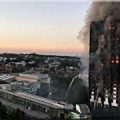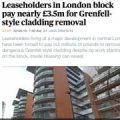 Calls for the government to lend private blocks of flats cash to pay for fire marshals and to remove Grenfell cladding may be problematic.
Calls for the government to lend private blocks of flats cash to pay for fire marshals and to remove Grenfell cladding may be problematic.
Martin Boyd, trustee of LKP, which has been advising leaseholders trapped in the cladding debacle, warns it may not be as simple as the government stepping in to loan money.
He told Inside Housing magazine this week:
“I don’t think they can even lend the money, because the problem is if you lend the money somebody’s got to agree to pay it back.
“The first thing is, are you going to assume the leaseholders are the ones liable to pay the money back?
“Or, will you go to developers and say, ‘We’ll lend you the money and you’ve got to pay it back’? At which point the developers will say, ‘Hang on, were not doing it’.
“If you try and write to the leaseholders some of them say, ‘Well, I’ve got no means to pay you back because I’m effectively bust’.
“In the end, it forces everyone to go to court, which ends up with the worst possible scenario that everyone’s trying to avoid – which is that the leaseholders are stuck with the bill.”
Leaseholders are stuck between a rock and a hard place, according to Inside Housing.
“The essential issue is that clearly the leaseholders aren’t responsible for what are now deemed to be the defects in the cladding.
“But they have no means of litigating against people who may be responsible. So they have no easy means where they can go back and sue the developer, or the local authority, or the cladding manufacturer.”
At the Fresh Building in Salford, the leaseholders recently lost a tribunal case over who should pay for a 24-hour fire warden patrol in the block and now face service charges of roughly £100,000 collectively.
More than 300 social housing blocks and 130 private residential blocks have cladding that is not fire safe and should be removed from the buildings.
Inside Housing lists the following sites, some of which were not mentioned in the cladding debate on Tuesday:
• Babbage Point, Greenwich
• Cityscape, Croydon
• Fresh Building, Salford
• Glasgow Harbour, Glasgow
• Hanover House, Reading
• Heysmoor Heights, Liverpool
• New Capital Quay, Greenwich
• New Festival Quarter, Limehouse
• Nova House, Slough
• St Lawrence House, Reading
• The Anchorage, Southport
Leaseholders in private blocks are discovering that cladding is a potential fire safety hazard
Many residents of private tower blocks have discovered that the cladding decorating their buildings is a potential hazard. Sophie Barnes investigates





 Grenfell cladding debate: Who thinks offshore freeholders will pay (apart from government ministers)?
Grenfell cladding debate: Who thinks offshore freeholders will pay (apart from government ministers)?






















Our development does not have cladding, so I post these comments for consideration. As the cladding is a fire hazard are there not grounds for seeking a legal determination over the question whether the Lessor has beached the lease? In my original 1960’s lease there is a clause that says the Lessor has a responsibility to ‘manage and maintain the retained property in accordance with the principles of good estate management’ and those principles surely are now interpreted in light of the RICS code of practice on Service Charges and Residential Management Code (3rd edition, 2016). If the fault does not lie with the Lessor then surely the Government have to step in and hold the designers and builders accountable. Perhaps, if they threatened to withdraw Help to Buy and hit them where it hurts, i.e. nice fat bonuses funded by Help to Buy and inflated property prices, then they may start to take notice.
Ps. I have just read the ding-dong battle over whether ‘Interested’ has a vested interest in maintaining the status quo. And so for clarity, I wish to make it clear that I am a leaseholder but have chosen not to give my name after it became clear to me sometime ago that a ground rent investor was fishing for information in the hope that he/she could find out where I lived and see if the freeholder was interested in selling the freehold after I revealed that I had been offered an ‘informal’ lease extension with a doubling ground rent structure. I have now extended my lease via the formal statutory route and researched the shady ground rent investment market and will be getting out of the leasehold market as soon as I can as I have seen very clearly that it is a system that has been designed to fleece leaseholders at every opportunity and treat them like second class citizens, and that simply is not good enough for a modern democracy. I won’t go into all the boring details of the latest battle over a massive hike in service charges, the scam of insurance commissions and undeclared conflicts of interest but for those of you (esp. the MPs) who have not lived under this system, I can tell you from first hand experience that it is an unjust and unrighteous system that ought to be consigned to the bin of history. Parliament has a duty to act for the common good and the sooner the better. Over and out. This also may be my last post before I move back into the freehold market but I will do my best to help the leaseholder cause and pass on the results of my research into how the lease extension racket works to LKP, and why the doubling of ground rents are such an attractive proposition to investors, in the hope that it may help the MPs see things more clearly and grasp hold of the need to abolish leasehold.
Hi “A fleeced leaseholder”. I’d not fret about using pseudonym. Real names might be random too! I guess only LKP know from seeing regular email addresses?
As for article… personally I see the government front and centre being ‘morally’ liable for this scandal, to use the SoS’s term.
It is their job to have a safe regularity framework for its citizens. Why else do MPs get elected but to keep their constituents safe, etc? Feels to me like a rush to deregulate to free up profits left citizens not safe?
No loans needed – just fork out. Government spends millions on extravagant projects tax payers get no say in, so tax payers hardly have just cause to moan over a life or death matter.
As for the pointless debate about whether commonhold would make things easier, this reminds me of tourists asking a Galway farmer the quickest way to get to Dublin. “I wouldn’t start from here,” says he.
Converting to commonhold obviously cannot solve the current cladding scandal. The system should have been changed long ago and been linked to rigorous regulation of building standards holding liable those who sign off or develop or convert premises for residential use. Pretty staggering that nobody is liable in law but the hapless leaseholder who has no right to add even a shower in their home? Obscene.
The cladding scandal merely exposes the disgusting and quite deliberately designed English fleecehold tenure system. Either it was designed deliberately or all previous legislators who kept the leasehold system going were all gormless eejits, and I don’t believe this for a second.
Fools and their money are easily parted, as the saying goes. Guess who are the only fools in leasehold?
Oh dear, Secretary of State has just repeated the moral argument that freeholders should pay for cladding remedial work.
What a waste of a parliamentary question and answer. Ministerial salaries should be docked for time wasting.
Ministerial salaries should be well and truly “docked” for doing absolutely nothing meaningful to sort out so many of the outstanding problems they stated would be sorted. Such as the cladding issue, leasehold house sales being stopped, onerous leases etc, it’s a never ending list that gets bigger.
All we hear from the government is words words words